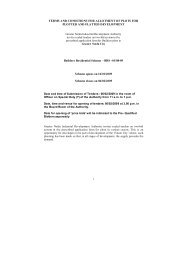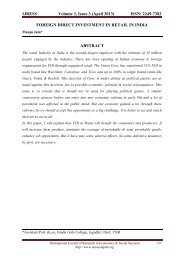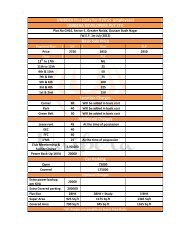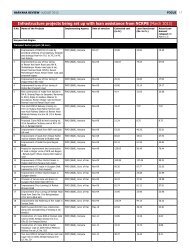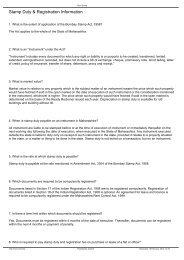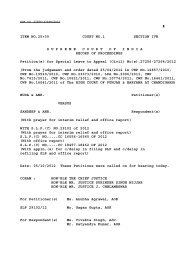eLegalix - Allahabad High Court Judgment Information System ...
eLegalix - Allahabad High Court Judgment Information System ...
eLegalix - Allahabad High Court Judgment Information System ...
You also want an ePaper? Increase the reach of your titles
YUMPU automatically turns print PDFs into web optimized ePapers that Google loves.
JUDGMENT/ORDER IN - WRIT - C No. 37443 of 2011 at <strong>Allahabad</strong> Dated-21.10....http://elegalix.allahabadhighcourt.in/elegalix/WebShow<strong>Judgment</strong>.doPage 164 of 19710/21/2011<strong>High</strong> <strong>Court</strong> was wrong in allowing the writ appeal"In (1996) 1 Supreme <strong>Court</strong> Cases 501, Municipal Corporation of Greater Bombay Vs. Industrial DevelopmentInvestment Corporation Pvt. Ltd., it was laid down in paragraph 29 (which has been quoted above) that whenaward was passed and possession was taken the <strong>Court</strong> would not have exercised the power under Article 226 ofthe Constitution to quash the acquisition.In State Of Rajasthan & Ors vs D.R. Laxmi & Ors (1996) 6 Supreme <strong>Court</strong> Cases 445 following was laid down inparagraph 9:"Recently, another Bench of this <strong>Court</strong> in Municipal Corporation of Greater Bombay Vs. Industrial Development &Investment C. (P) Ltd. [C.A. No. 282 of 1989] decided on September 6, 1996 reexamined the entire case law andheld that once the land was vested in the State, the <strong>Court</strong> was not justified in interfering with the notificationpublished under appropriate provisions of the Act. Delay in challenging the notification was fatal and writ petitionentails with dismissal on grounds of latches. It is thus, well settled law that when there is inordinate delay in filingthe writ petition and when all steps taken in the acquisition proceedings have become final, the <strong>Court</strong> should beloathe to quash the notifications. The <strong>High</strong> <strong>Court</strong> has, no doubt, discretionary powers under Article 226 of theConstitution to quash the notification under Section 4(1) and declaration under Section 6. But it should beexercised taking all relevant factors into pragmatic consideration. When the award was passed and possessionwas taken, the <strong>Court</strong> should not have exercised its power to quash the award which is a material factor to betaken into consideration before exercising the power under Article 226."The above decision of the apex <strong>Court</strong> by three Judges Bench had clearly laid down that the <strong>High</strong> <strong>Court</strong> has nodoubt discretionary power under Article 226 of the Constitution of India to quash the notification under section 4and notification under section 6 but it should be exercised taking all relevant factors into pragmatic consideration.As laid own by the apex <strong>Court</strong> in the <strong>Judgment</strong> Today 2009 (9) S.C. 537 National Thermal Power Corporation Ltd.Vs. Mahesh Dutta and others that in the event possession of land in respect whereof a notification had beenissued had been taken over, the State would be denuded of its power to withdraw from the acquisition in terms ofSection 48 of the Act. It is true that under the Act after vesting of the possession in the State under section 17(1),there is no provision under which the acquisition can be withdrawn or vesting can be nullified but the exercise ofjurisdiction under Article 226 challenging the acquisition cannot be hedged with any such limitation that court inappropriate case cannot quash the notifications and the entire acquisition proceedings. To hold that after land isvested in the State under section 17(1), the acquisition cannot be quashed would be putting limitation in theexercise of jurisdiction under Article 226 where no such limitation has been contemplated. It is another case that<strong>High</strong> <strong>Court</strong> while exercising its writ jurisdiction may take a decision to quash or not to quash the notificationstaking into consideration all relevant factors but that is matter of exercise of power and submission that acqusitioncannot be quashed after vesting of land in favour of the State has to be rejected. In the event, it is accetped thatafter land is vested in the State, acquisition cannot be quashed. Only thing which may be required for the State tosave all acqusition is to somehow take possession under section 17(1) and thereafter to tell the <strong>Court</strong> that nowthe acquisition cannot be quashed. The Apex <strong>Court</strong> in Narmada Bachao Andolan (supra) has laid down the courtsare not to perpetuate an illegality rather it is the duty of the <strong>Court</strong> to rectify mistake. Following was laid down inparagraph 63:"63. The <strong>Court</strong>s are not to perpetuate an illegality, rather it is the duty of the courts to rectify mistakes. Whiledealing with a similar issue, this <strong>Court</strong> in Hotel Balaji & Ors. etc. etc. v. State of A.P. & Ors. etc. etc., AIR 1993 SC1048 observed as under: "...To perpetuate an error is no heroism. To rectify it is the compulsion of judicialconscience. In this, we derive comfort and strength from the wise and inspiring words of Justice Bronson in Piercev. Delameter (A.M.Y. at page 18: `a Judge ought to be wise enough to know that he is fallible and, therefore, everready to learn: great and honest enough to discard all mere pride of opinion and follow truth wherever it may lead:and courageous enough to acknowledge his errors". (See also Nirmal Jeet Kaur v. State of M.P. & Anr., (2004) 7SCC 558; and Mayuram Subramanian Srinivasan v. CBI, AIR 2006 SC 2449)."In the present case, the issue is already concluded by the judgment of the apex <strong>Court</strong>. In writ petition No. 5670 of2007 pertaining to village Yakubpur was filed challenging the notification dated 26.9.2006 under section 4 readwith Section 17(1) and Section 17(4) and notification under section 6 dated 19.1.2007. After the notification, theState had taken possession on 27.1.2007. The writ petition was filed in this <strong>Court</strong> on 31.1.2007 in which writpetition on 9.2.2009, the Division Bench of this <strong>Court</strong> passed following order:" This writ petition has been filed by the petitioner challenging the land acquisition proceedings dispensing withthe provisions of Section 5A and urgency clause 17(4) and notification under section 4(1) of the Land Acquisition





